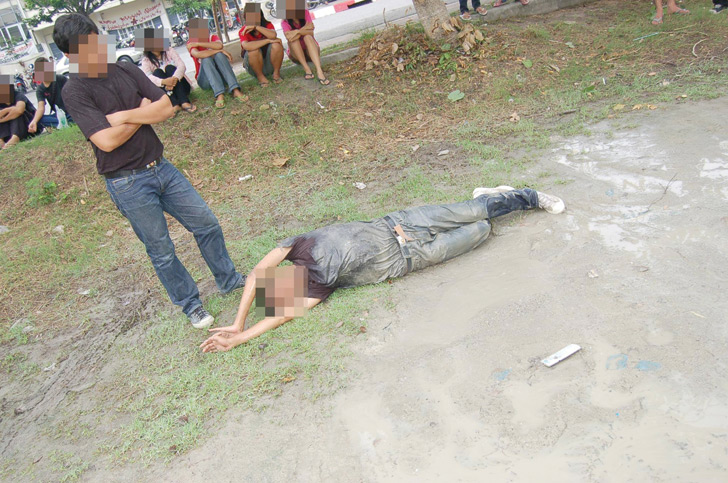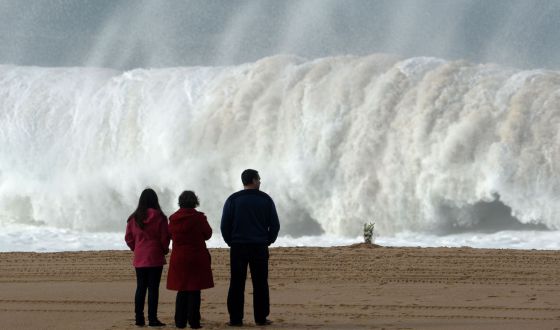Initiation or humiliation?: Cases of hazing around the world
Ambika Gogna
Sign up now: Get ST's newsletters delivered to your inbox

Students passing food with their mouths at a NUS orientation camp.
PHOTO: STOMP
University students in Singapore recently expressed their unhappiness over the inappropriate actions they have had to perform as part of the orientation programme.
The New Paper reported on July 26 how students from the National University of Singapore were made to perform actions, such as enacting a rape scene, that made the freshmen extremely uncomfortable.
NUS has since suspended all freshmen orientation activities and the NUS Students' Union has issued an official apology.
Initiation rituals that involve harassment are known as hazing, a practice in institutions or associations to "welcome" newcomers to the fold.
But the activities that freshmen are made to do have often gone to extremes and caused mental or physical stress, and in some instances even death.
Here is a look at some of the worst, recent cases of hazing around the world.
1. United States: Fatal blows

In December 2013, Chun Hsien Deng, a student at Baruch College in Manhattan, was made to run outdoors during winter past his fraternity brothers who lined up to tackle him. They were at a retreat in Pennsylvania.
He was made to wear a blindfold and carry a backpack filled with 9 to 13kg of sand.
According to the New York Times, the fraternity brothers became angry when 19-year-old Deng fought back and refused to cooperate.
One of them charged at him from about 5m away, while others pushed him to the ground. The harsh blows coupled with the heavy backpack ultimately led to his death.
Thirty-seven of the Pi Delta Psi fraternity brothers faced criminal charges, with five of them facing charges of third-degree murder.
The trial is ongoing.
2. Indonesia: Collapsed after climb

Fikri Dolas Mantya Surya, 19, died in October 2013 during an orientation camp led by students of the Malang National Technology Institute (ITN) in East Java, where he was an incoming freshman.
During the orientation camp, held in an area called Goa Cina, the organisers of the camp confiscated the freshmen's food, their phones, and barred them from drinking water on a 80km journey to their destination.
Other hazing activities included getting his head dunked in sand and water, simulating sex acts, crawling on the ground filled with bits of coral for long distances, getting little food and being beaten up for making a snarky comment.
On the day he died, Fikri had been made to climb a hill, but he collapsed and lost consciousness when he reached the top.
He was taken to the hospital where doctors pronounced him dead. The suspected cause was asphyxiation.
All defendants in his murder trial were acquitted due to the family's refusal for an autopsy of the body.
3. The Philippines: Beaten to death

In June 2014, Guillo Cesar Servando, a member of the Tau Gamma Phi fraternity in the College of Saint Benilde, was beaten to death during a Tau Gamma Phi initiation ritual.
According to his cousin, the 18-year-old was beaten with a paddle and a belt.
He and three others who had been hazed were taken back to their residence, where the three immediately called an ambulance upon noticing he was unconscious.
But he was pronounced dead by medical officials when they arrived at the scene.
The other three were taken to the Philippines General Hospital for their injuries.
Police identified some of the people involved in the hazing from CCTV footage which showed Servando being dragged back to his residence.
The defendants filed a motion to dismiss the case against them, which the court recently approved.
The judge ruled the family failed to prove Servando was hazed for the purpose of joining the fraternity.
4. Thailand: Found dead on beach

In Thailand, initiation rituals known as rub nong are inherent in Thailand's education system.
The term has become almost synonymous with hazing.
People see rub nong as a way to help uphold the Thai sentiment of SOTUS (Seniority, Order, Tradition, Unity, Spirit) that nurtures respect for seniority and discipline.
In August 2014, Pokai Saengrojrat, 17, a freshman in college, went to a beach south of Bangkok to go through initiation rituals.
According to the Bangkok Post, Saengrojrat's seniors pushed his head into the sand as the sea water washed over him, and also made him and his fellow students drink large amounts of alcohol.
Other reports said the students were also kicked by the seniors.
The next morning, Saengrojrat was found lying unconscious in the sand. It was later revealed he had been dead for an hour before being brought to the hospital.
A preliminary autopsy conducted suggested he died from respiratory and blood circulation failure. He had also previously been diagnosed with leukaemia.
The school provided his family with 40,000 baht and compensation as a part of the life insurance policy for students. The director of the university was also accused of negligence.
5. Portugal: Six bodies washed ashore

In December 2013, six university students, between the ages of 21 and 24, in Portugal died due to a hazing ritual.
The students, who were made to get into the water at a beach south of Lisbon, ended up getting swept away by a wave.
The first body of a male student was found washed up on shore, and soon after the bodies of four women and one other man were also discovered.
According to a New York Times report, the student whose body was the first to be found had told his parents that he and other students had been preparing for hazing activities, also known as "praxes" in Portugal, at a house they had rented.
The incident shone a light on the hazing problem in Portugal's private universities, which are considered less prestigious than public ones.
The rituals are thought to stem from a need to create a sense of high regard of being in a private university.
The incident led to a national debate about hazing in Portugal.
Sources: Jakarta Globe, New York Times, Philippine Daily Inquirer, Bangkok Post, South East Asia Globe, The Nation (Thailand)


